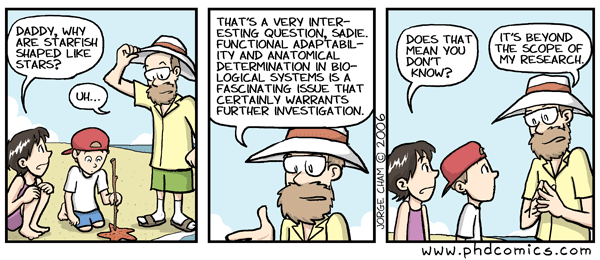Wednesday, March 21, 2007
Dreamer
My dreams will just be dreams as long as I only dream and not act. I realise the great potential in these dreams, but at the same time I realise the importance of being down-to-earth, on the importance of knowing where I stand right now as against where I dream myself to be. Consistency in work is more important than random spurts of good work. That's what a phd is all about...Consistent work in an area that interests' you.
And finally, I dream of being consistent in my work.
Saturday, March 17, 2007
VRP
Also a nice bibliography of the algorithms and solution techniques for VRP and its variants can be found here.
Sunday, March 11, 2007
Writing a research proposal
1) When to reference and when not to reference when you write a paper
2) Giving a presentation: What needs to be taken care of, the good and bad of a few case presentations.
3) Research proposal: Writing one effectively.
I will just discuss the third take home. Here's a good article on writing a research proposal. Find a pdf version here.
To summarize the article:
There are two things to writing a research proposal - a) The writing part of it b) The content and structure part of it.
The writing part is similar to writing any document - The document should be coherent, have a flow, should be concise and also be easily understandable to the targetted audience.
The content can be summarized as follows and is very similar to the structure of a thesis:
a) Abstract - What is it that you propose to do in your research summarized briefly in a paragraph.
b) Introduction - i) Should clearly define the objectives of the study or research to be conducted
ii) Should establish the context of the study and its significance and/or contribution practically(application) and theoretically(model/technique development/formulation of the problem, etc).
iii) The main problem features should be described and the scope of the problem clearly delineated.
c) Literature review - Should include all contributions from literature relevant to the problem area. The contributions should not be rambling but should be expressed concisely though effectively.
d) Solution Methodology - Should be described in the context of what is in the literature. Should narrow down a few solution techniques and the pros and cons of this subset of techniques should be briefly described.
e) Data - What data do you think is required for this problem. How are you going to get it(Experiments/data collection, etc).
f) Discussion - Summarize the research briefly. Discuss the pros and cons of the solution methodology adopted, data to be used, etc.
Usually a research proposal is made to obtain grants and funding for the research. So a research proposal should be written in a manner that highlights the significance of the research and its contribution. Hence the emphasis on both the 'writing' and the 'content'.
Wednesday, March 7, 2007
A case of mistaken identity
Me: "Which department are you from?"
Him: 'Computer science department'
Me: "So are you a Phd student?"
Him: 'No I am teaching'
I bulb for a moment and then.....
Me: "So you... you are an assistant professor?"
Him: 'Yeah'
I am, needless to say, a little embarassed; but what can one do when the professor looks, walks, talks like a grad student. After some more small talk, I go my way.
Tuesday, March 6, 2007
Fundamentals of Optimization
This is one of a kind course in that it goes into the fundamentals of the subject. Many people (me included) use the word 'optimization' loosely, but hardly realise that there is a whole theory(as I gleaned from this course) that lays the basis for all the algorithms and optimization techniques being widely used in various engineering, science and health disciplines.
A note on my course-mates: Most of them were studs in the field(grad level math course machi)
who left me amazed on their depth in the subject as was evident from the questions fielded in the class. Through this course, I have been fortunate enough to have the experience of knowing first hand how tough Math can be (I had strange opinions on Math before coming here). I might get away with a 3.7 or 3.8 in the course, but you see these assignments were very instructive and guiding the student onto the methodology and analysis required to solve the problems. Ofcourse, I had to understand the theory before attempting the assignment, but as I said earlier the big picture is still missing. I have the bits and pieces from each of these chapters, only I need to piece them together in the coming future.
As a final note, this course(the last course taught by the prof) was taught by a highly knowledgeable prof who was very precise and exact in his development of subject(something new to me since we engineers make a lot of assumptions whenever we can) and as a result, has sort of aroused my interest in optimization theory. Let's see where I can go from here.
On thinking - Part II
Let me further explore the threads in the previous post by taking up a quote on thinking -
Those who know how to think need no teachers - MKG
I decided to jot down my thoughts as I attempted to understand what this quote really meant:
--------------------------------------------------------------------------------
What did he mean by this statement? Does he mean there is a way of thinking that is to be known, sort of structured way of thinking that is more conducive to self growth? I have heard that mathematicians have a structured way of thinking through problems. But then, they also solve a lot of problems and hence think a lot. Is thinking, say by questioning a given statement, shredding it to the minutae, and analyzing each minutae and then putting it back again a way of thinking? And if I were to know this way of thinking and apply it in reality, does that amount to knowing how to think? Does he mean independent thinking? Or does he mean those who think often, need no teachers? Or does he mean if you know how to think, as in withdraw from the world, in a calm environment and think..does he mean that? Whatever be the case, the central element here is ‘what is thinking’? And why is it so important?
Can an analogy be drawn between exercising your body and exercising your mind: the more you exercise, the more you can exercise (body or mind). Is getting insights a valid output of thinking (I am assuming here that I know what an insight is..ha!)? Is effective thinking a function of number of insights you arrive at during your thinking process?
How do you quantify the effectiveness of your thinking? I just realized I am thinking, if this is what thinking is. You can have many thoughts that come through your mind, but only a few maybe relevant to what you are thinking about or maybe you just don’t know if they are relevant or not. Can you know if your insight is because of the propagation of such and such a thought? Is thinking a state of mind? Is it a state of higher awareness?
--------------------------------------------------------------------------------------
Now, you can see my thinking as seen from above is hardly structured and many of the thoughts may not make sense, but the key thing is there are a lot of questions raised. So is thinking just about raising more questions? And how much of thinking is logic?
Analyse this.. You have a question pop up in your mind, say, "What is thinking?". How do you approach this question? You could start with what you know about thinking, past experiences of real deep thought and maybe understand the conditions that lead to such thinking. I don't know what thinking is as of yet, but mimicking these conditions could help me do whatever it is that happens during thinking. But isn't that logic? That's what Neils Bohr had to say: "No, no you're not thinking; you are just being logical."
So if I go by the reductionist approach, there are two processes going on here:a) Arriving at questions b) Addressing these questions through a systematic reasoning process.
One seems due to thinking and the other to what we broadly call logic. But are they really two disparate entities or do they contribute to each other?
Does thinking add to your logic, that is, does it build your logical skills and does logic help thinking?..I mean, to start with, you either have to have logic or thinking (chicken or egg analogy). Now, what do we mean by logic ?
Logic : a particular method of reasoning or argumentation. Notice that, the definition is built around 'a particular method of reasoning', which is indicative of assumptions used to understand a problem, which may also mean the perspective you bring in to understand the problem. And we discussed earlier that thinking might be a process of broadening the perspective or model with which to view the world. So is logic a convenient or specific contextual meaning of the word 'perspective' and can logic be a measure of how much you think?
In conclusion(to this blog), through my understanding of the thinking process and my model of the world, I get an impression(read: abstraction) that thinking is all to do with going to any level of the model we have of the world and analysing the assumptions therein through logic(which involves all levels of the model we have) and refining it or outright discarding it, if the assumptions don't seem right (how this can happen I don't know, since all the logic we have is based on the assumptions of the model with which we view the world and within this context, everything seems self consistent, except that thinking, which is merely raising questions(or is it?), changes these assumptions! Insight might be a key word here that may need further exploration).

